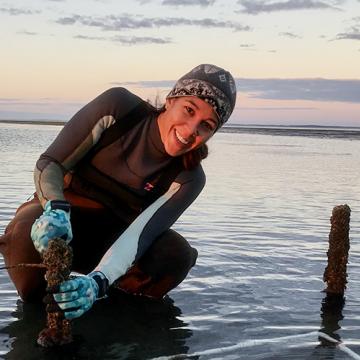-
NewsKidney disease is typically linked to conditions like diabetes and high blood pressure, which gradually wear down the kidneys’ delicate systems that keep the body in balance. But the communities that Duke University researchers Nishad Jayasundara , PhD, and nephrologist Anna Strasma , MD, study are facing a different problem.
-
NewsModeling experiments show Pacific warm and cold patches persisted even when continents were in different places
-
NewsPh.D. students Keqi He, Rafaella Lobo honored for their respective scholarship.
-
NewsMeet the Hunt Lab, learn more about its research focus, a lab member's experience in the lab and the opportunities the lab offers Duke students.
-
NewsMeet the Stapleton Lab, learn more about its research focus, a postdoc's experience in the lab and the opportunities the lab offers Duke students.
-
NewsGulf War Illness (GWI), which affects approximately 250,000 U.S. veterans, has been found to significantly reduce the ability of white blood cells to make energy and creates a measurable biochemical difference in veterans who have the disease. The finding comes from a physician who noticed GWI symptoms paralleled those of mitochondrial diseases. Analysis revealed significantly lower levels of extracellular acidification and oxygen consumption in the white blood cells of veterans with GWI.
-
NewsMeet the Silliman Lab, learn more about its research focus, a PhD student's experience in the lab and the opportunities the lab offers Duke students.
-
NewsA new study on the impacts of prenatal exposure to toxic metals linked to artisanal gold mining and other sources in Madre de Dios, Peru, finds that mercury has no direct effect on a newborn’s birth weight or gestational age. It’s a different story, though, for lead, which may also be released by mining operations but more likely is consumed when people eat wild game that inadvertently still contains small bullet fragments.
-
NewsMaintaining a water level between 20 and 30 centimeters below the local water table will boost southern peatlands’ carbon storage and reduce the amount of greenhouse gases they release back into the atmosphere during dry periods by up to 90%, a Duke University study finds.
-
NewsDuke University scientists have received a five-year, $2.6 million grant from the National Institute of Environmental Health Sciences (NIEHS) to study molecular mechanisms that can help our bodies fight respiratory inflammation caused by air pollution.
-
NewsPeople in areas where drinking water is contaminated with PFAS often want to know their PFAS blood levels but have trouble gaining access to reliable testing, which traditionally involves having their blood drawn by a medical professional.
-
NewsBrian R. Silliman, Rachel Carson Distinguished Professor of Marine Conservation Biology at Duke University’s Nicholas School of the Environment, has been elected a Fellow of the Ecological Society of America (ESA).
-
-
NewsThe National Science Foundation and the Paul G. Allen Family Foundation have awarded a $1.2 million grant to support a new initiative aimed at boosting ecosystem restoration and climate resilience along North Carolina’s coast.














